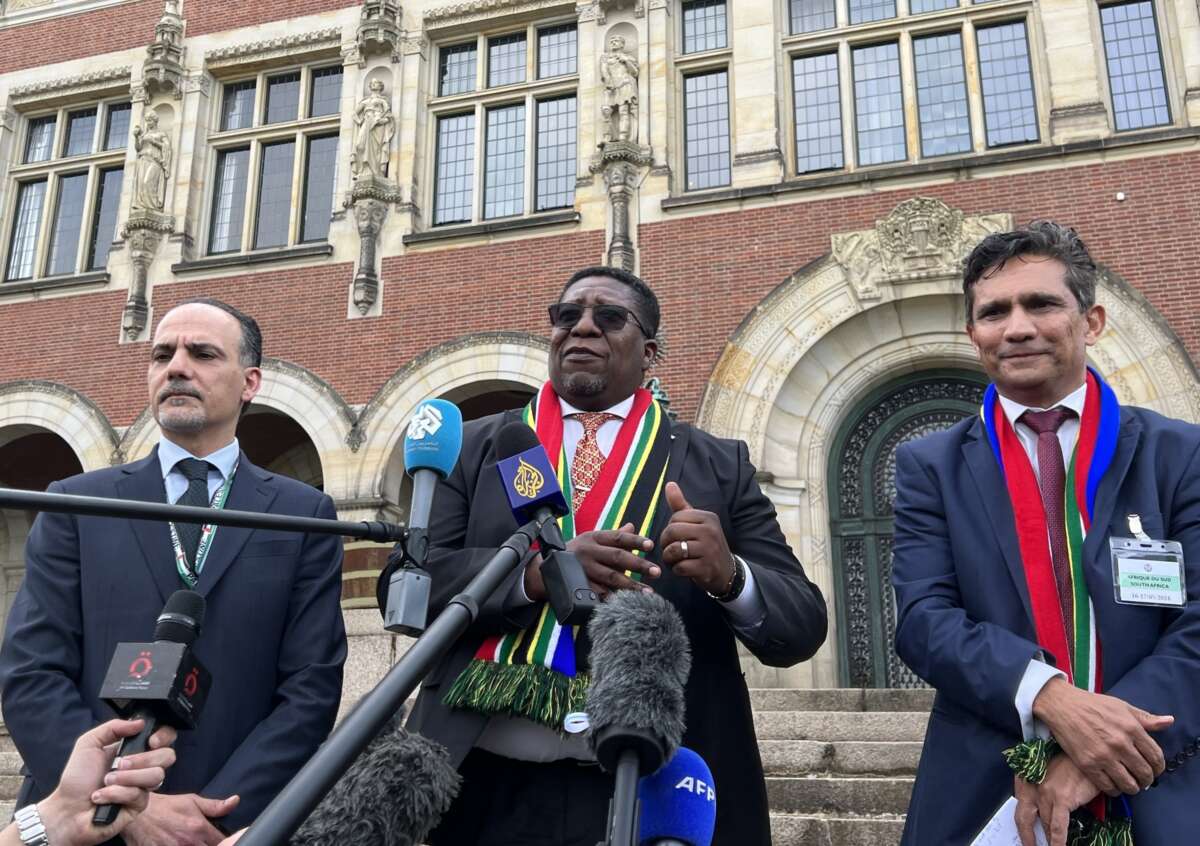Honest, paywall-free news is rare. Please support our boldly independent journalism with a donation of any size.
In an emergency hearing furthering South Africa’s genocide case on Thursday, South Africa warned the International Court of Justice (ICJ) that Israel has begun a new stage of genocide in Gaza that the court must move against with “extreme urgency.”
South Africa’s legal team is seeking provisional measures from the ICJ for Israel to immediately withdraw from Rafah and take every action possible to surge humanitarian aid into Gaza, on top of orders for Israel to comply with provisional orders the court issued in January and March.
“Israel is escalating its attacks on Palestinians in Gaza, and in so doing, is willfully breaching the binding orders of this court,” South African ambassador to the Netherlands Vusimuzi Madonsela said in opening remarks.
“South Africa had hoped, when we last appeared before this court, to halt this genocidal process to preserve Palestine and its people,” Madonsela continued. “Instead, Israel’s genocide has continued apace and has just reached a new and horrific stage.”
In oral arguments, the South African delegation stressed the profound danger that Israel’s invasion of Rafah poses for the future of all Palestinians in Gaza, citing Israel’s near-total aid blockade and violent dismantling of nearly all basic infrastructure, including the region’s medical system.
South African lawyer Tembeka Ngcukaitobi said that a “Rafah [invasion] is the last stage of the ‘total annihilation’ of Palestinian life. Without Rafah, the possibility to rebuild and reconstruct Palestinian life will be lost forever.”
Ngcukaitobi laid out numerous counts of Israeli leaders displaying “genocidal intent,” especially in regards to repeated warnings from humanitarian groups and world leaders that a Rafah invasion would create a humanitarian crisis of unprecedented magnitude in modern times.
The delegation presented evidence from its document filing for the request for the emergency hearing, including reports that hadn’t previously been brought before the court. These reports highlight the existence of “extermination zones” in Gaza where all Palestinians are considered a target and recent developments like Israel’s closing of the Rafah and Karem Abu Salem crossings in southern Gaza, which has caused severe shortages of basic needs like food.
Israel has continuously defended its bombing and starvation campaign by claiming that it has the right to self defense — but lawyer Vaughan Lowe, representing the South African delegation, pointed out that committing a genocide is not a valid form of self defense.
“First, the right of self-defense does not give a State a license to use unlimited violence,” Lowe said. “Second, nothing, not self-defence or anything else, can ever justify genocide. The prohibition on genocide is absolute, a peremptory norm of international law. Third, the Court ruled in 2004 that there is no right of self-defense by an occupying State against the territory that it occupies.”
It is unclear when the ICJ will make a decision on the request, though South Africa’s team has argued that this may be the ICJ’s last chance to save the lives of countless Palestinians in Gaza. Though the ICJ’s orders are legally binding, Israel has snubbed previous orders to allow more humanitarian access to Gaza and pull back on its genocidal actions, instead intensifying both its blockade and its attacks on Palestinians with no refuge left.
A terrifying moment. We appeal for your support.
In the last weeks, we have witnessed an authoritarian assault on communities in Minnesota and across the nation.
The need for truthful, grassroots reporting is urgent at this cataclysmic historical moment. Yet, Trump-aligned billionaires and other allies have taken over many legacy media outlets — the culmination of a decades-long campaign to place control of the narrative into the hands of the political right.
We refuse to let Trump’s blatant propaganda machine go unchecked. Untethered to corporate ownership or advertisers, Truthout remains fearless in our reporting and our determination to use journalism as a tool for justice.
But we need your help just to fund our basic expenses. Over 80 percent of Truthout’s funding comes from small individual donations from our community of readers, and over a third of our total budget is supported by recurring monthly donors.
Truthout’s fundraiser ended last night, and we fell just short of our goal. But your support still matters immensely. Whether you can make a small monthly donation or a larger one-time gift, Truthout only works with your help.
